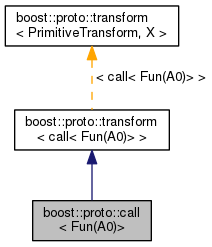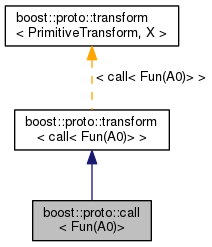Either call the PolymorphicFunctionObject with 1 argument, or invoke the PrimitiveTransform with 3 arguments. More...
#include <call.hpp>


Classes | |
| struct | impl |
Let x be when<_, A0>()(e, s, d) and X be the type of x. More... | |
| struct | impl2 |
| struct | impl2< Expr, State, Data, true > |
Public Types | |
| typedef call< Fun(A0)> | transform_type |
Public Member Functions | |
| BOOST_PROTO_CALLABLE () typedef X proto_is_transform_ | |
| BOOST_FORCEINLINE boost::proto::detail::apply_transform < transform_type(Expr const &)> ::result_type | operator() (Expr &&e) const |
| BOOST_FORCEINLINE boost::proto::detail::apply_transform < transform_type(Expr const &, State const &)> ::result_type | operator() (Expr &&e, State &&s) const |
| BOOST_FORCEINLINE boost::proto::detail::apply_transform < transform_type(Expr const &, State const &, Data const &)> ::result_type | operator() (Expr &&e, State &&s, Data &&d) const |
Either call the PolymorphicFunctionObject with 1 argument, or invoke the PrimitiveTransform with 3 arguments.
|
inherited |
|
inherited |
|
inlineinherited |
|
inlineinherited |
|
inlineinherited |